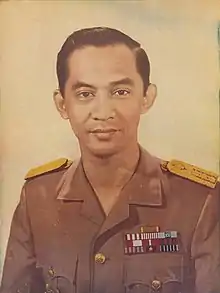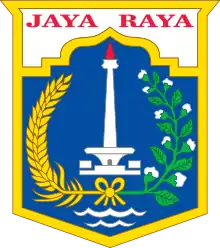Ali Sadikin
Ali Sadikin (7 July 1928 – 20 May 2008), nicknamed Bang Ali, was an Indonesian politician of Sundanese background. He served as the governor of Jakarta, the country's capital, from 1966 to 1977.
Ali Sadikin | |
|---|---|
 | |
| 7th Governor of Jakarta | |
| In office 28 April 1966 – 5 July 1977 | |
| President | SukarnoSuharto |
| Preceded by | Soemarno Sosroatmodjo |
| Succeeded by | Tjokropranolo |
| 16th Transportation Minister of Indonesia[1] | |
| In office 13 November 1963 – 28 March 1966 | |
| President | Sukarno |
| Preceded by | Abdoelmoettalip Danoeningrat |
| Succeeded by | Susatyo Mardi |
| 1st Coordinating Minister for Maritime Affairs of Indonesia | |
| In office 27 August 1964 – 28 March 1966 | |
| President | Sukarno |
| Succeeded by | Jatidjan |
| 8th Chairman of PSSI | |
| In office 1977–1981 | |
| Preceded by | Moehono |
| Succeeded by | Sjarnoebi Said |
| Personal details | |
| Born | 7 July 1928 Sumedang, West Java, Dutch East Indies |
| Died | 20 May 2008 (aged 79) Singapore |
| Nationality | Indonesia |
| Spouse(s) | Nani Arnasih (1954–1986) (until her death) Linda Syamsuddin Mangan (1987–2008) (until his death) |
| Children | Boy Bernardi Sadikin Edi Trisnadi Sadikin Irawan Hernadi Sadikin Benyamin Irwansyah Sadikin Yasser Umarsyah Sadikin |
| Signature | |
| Military service | |
| Allegiance | |
| Branch/service | |
| Years of service | 1945–1966 |
| Rank | |
| Unit | KKO |
Life and career
Sadikin would be known as the longest-serving governor of Jakarta from 1966-1977. Appointed by Sukarno, he likely had the full approval of Suharto. A former officer in the Indonesian Marine Corps, he saw the city as a battlefield.[2] He sought to improve public services, clear out slum dwellers, ban becaks (cycle rickshaws), and outlaw street peddlers.[3] Sadikin's role in bulldozing poor areas of Jakarta was part of a long history of struggle over land use in the region.[4]
Through legislation, Sadikin successfully wrested control over large amounts of poor housing. These areas he gave at minimal cost to developers such as the Jaya Group.[5] For Abidin Kusno,[6] Sadikin was part of a modernist program to attack irrationality, criminalize poverty, and create obedient national citizens. At the same time, he sought to kampung-ize city dwellers—to reinvest them with village sociality and mutual aid (gotong royong).[7]
Sadikin also tried to halt migration into Jakarta by declaring the city closed to newcomers. He issued residency cards in hope of enforcing the policy, but failed to curtail population growth.[8] One of the earliest and most outspoken advocates of family planning, Sadikin showed that Muslim groups would support these policies.[9] Under Sadikin, Jakartan pilgrimage to Mecca and other holy places surged.[10] Hungry for revenue for his projects, Sadikin legalized gambling and steambaths (de facto brothels), much to the outrage of many Muslim groups.[11]
During the 1960s, he founded an advocacy group for the waria.[12] In 1975, Sadikin famously attended the wedding of Indonesia's first trans woman legally recognised as her true gender, Vivian Rubiyanti Iskandar.[13] Although Sadikin's restructuring of land in Jakarta displaced countless urban poor, he also advocated for the LBH, the Legal Aid Society; an organization which was used by both the private sector and the urban poor. After having allegedly "allowed" Golkar to lose an election in Jakarta, Sadikin was removed from office.[14] Despite Sadikin's heavy-handed urban reforms, he is often cited as a popular leader.[15] In 1978, mass student protests embroiled the capital, and students nominated Sadikin as an alternative president.[16]
In 1980, Sadikin helped found and lead the Petition of Fifty, a group of powerful and highly influential critics of the New Order. He regularly hosted their meetings at his home. Though he remained a resolute statist in favor of militarism, he opposed Suharto's consolidation of power in the government and military (ABRI).[17] It is likely that Sadikin's stature and popularity both bolstered the Petition of Fifty and helped to shield it from more severe repression.
References
- At that time, he served as a Sea Transportation Minister of Indonesia.
- Sadikin 1992
- Witton, Patrick; Mark Elliott; Paul Greenway; Virginia Jealous (2003-11-15). Indonesia. Melbourne: Lonely Planet. pp. 138–139. ISBN 978-1-74059-154-6.
- Aspinall, Edward. “Indonesia: Civil society and Democratic Breakthrough” in Muthiah Alagappa (ed.) Civil Society and Political Change in Asia. Expanding and Contracting Democratic Space. Stanford University Press, Stanford, 2004, pp. 61-96.
- Douglas, M. (1989) 'The Environmental Sustainability of Development. Coordination, Incentives and Political Will in Land Use Planning for the Jakarta Metropolis', Third World Planning Review 11(2): 211–38; Douglas, M. (1992) 'The Political Economy of Urban Poverty and Environmental Management in Asia: Access, Empowerment and Community-based Alternatives', Environment and Urbanization 4(2): 9–32; Steele, Janet. 2005. Wars Within The Story of Tempo an Independent Magazine in Soeharto's Indonesia. Jakarta: Equinox.
- Associate Professor, Centre for Southeast Asian Studies, University of British Columbia.
- Kusno, Abidin. 2000. Behind the Postcolonial: Architecture, Urban Space and Political Cultures. NY: Routledge.
- Forbes, Dean. "Jakarta: Globalization, economic crisis, and social change," pp. 268-298, in Josef Gugler (ed.), World Cities beyond the West: Globalization, Development and Inequality, p. 273
- Blackburn, Susan. Women and the State in Modern Indonesia Cambridge, UK: Cambridge University Press. p. 152; see also a Ford Foundation report: Archived October 14, 2007, at the Wayback Machine
- Bianchi, Robert R. 2004. Guests of God: Pilgrimage and Politics in the Islamic World. Oxford: Oxford University Press, p. 185.
- Dick, Howard and Peter J. Rimmer, 2003. Cities, Transport and Communications: The Integration of Southeast Asia Since 1850., NY: Palgrave Macmillan. p 283; Effendy, Bahtiar. 2004. Islam and the State in Indonesia: Islam and the State in Indonesia. Athens, OH: Ohio University Press. p. 49.
- "Anti-gay hysteria is on the rise in Indonesia". The Economist. 21 September 2017.
- "Viva Vivian!". Historia - Majalah Sejarah Populer Pertama di Indonesia (in Indonesian). Retrieved 2020-07-24.
- Aspinall, Edward. 2005. "Regime Friction and Elite Dissidence," pp. 49-85 in Opposing Suharto: Compromise, Resistance, and Regime Change in Indonesia. Palo Alto, CA: Stanford University Press. p. 63
- Dick and Rimmer 2003.
- Kingsbury, Damien. 2002. The Politics of Indonesia, 2nd edition. Oxford: Oxford University Press. p. 87
- Aspinall, Edward. 2005. "Regime Friction and Elite Dissidence," pp. 49-85 in Opposing Suharto: Compromise, Resistance, and Regime Change in Indonesia. Palo Alto, CA: Stanford University Press. p. 61, 65
- Ali Sadikin passes away Archived 2008-05-21 at the Wayback Machine; ANTARA, 20 May 2008
External links
- Ramon Magsaysay Award biography
- Wet Earth and Warm People, a film by Michael Rubbo that includes a profile of Governor Sadikin ca. 1975
- (in Indonesian) Profile at TokohIndonesia
Books written by Sadikin
- Bang Ali demi Jakarta (1966-1977): Memoar (Indonesian) by Ali Sadikin, Ramadhan K. H., Jakarta Raya (Indonesia) Pustaka Sinar Harapan. 1992.
- Tantangan Demokrasi (Indonesian) by Ali Sadikin. Pustaka Sinar Harapan. 1995.
- Pers Bertanya, Bang Ali Menjawab (Indonesian) by Ali Sadikin, Ramadhan K. H. Pustaka Jaya. 1995.
| Political offices | ||
|---|---|---|
| Preceded by Soemarno Sosroatmodjo |
Governor of Jakarta 1966–1977 |
Succeeded by Tjokropranolo |
| Sporting positions | ||
| Preceded by Moehono |
Chairman of PSSI 1978–1981 |
Succeeded by Sjarnoebi Said |
